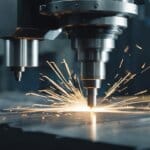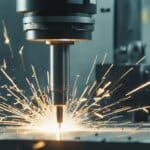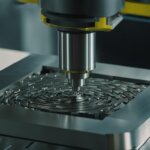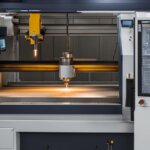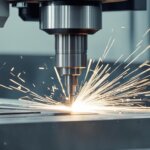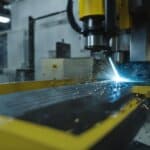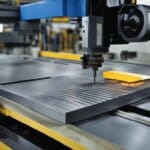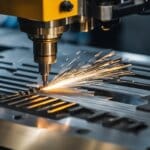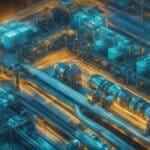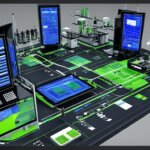Table of Contents
CNC machines have revolutionized modern manufacturing, emerging as the go-to industrial option for businesses across industries. From its inception as numerical control machines in the 1940s to the integration of CNC automation in the 1970s, CNC machining has transformed production chains and propelled the industry forward with its unparalleled capabilities.
The CNC machining market is booming, expected to reach a staggering USD 100.86 billion by 2025. The key to its success lies in the advantages it offers. First and foremost, CNC machines provide remarkable speed, enabling high-speed runs that were once unimaginable. This results in enhanced efficiency and the ability to undertake high-volume production with ease.
Consistency is another significant benefit of CNC machines. With automated precision, these machines deliver products with unwavering accuracy and uniformity, eliminating the risk of human error. This consistency is particularly crucial in industries that demand intricate designs and complex components, such as the automotive and aerospace sectors.
CNC machines are highly versatile, capable of adapting to a wide range of manufacturing needs. Whether it’s milling, drilling, turning, hobbing, grinding, or routing, these machines excel in every process. This versatility enables manufacturers to explore new possibilities and cater to a diverse array of requirements.
Furthermore, CNC machines prioritize safety, ensuring a secure working environment for operators. As these machines continue to evolve, future developments hold even greater promise. One such advancement is the integration of hybrid CNC-3D printing machines, combining the precision of CNC machining with the complexity of 3D printing. Additionally, automation with robots and integration with AI and IoT technologies are expected to further enhance CNC machining capabilities, improving design and 3D modeling.
In conclusion, CNC machines have become indispensable in modern manufacturing. With their unmatched speed, efficiency, consistency, and versatility, these machines play a pivotal role in driving the industry forward. As technology continues to progress, CNC machining will undoubtedly remain at the forefront of innovation, shaping the future of manufacturing.
Impact of CNC Machines in the Manufacturing Industry
CNC machining has revolutionized the manufacturing industry, offering a wide range of benefits for businesses. By utilizing computer-aided design (CAD) and computer-aided manufacturing (CAM) technologies, manufacturers can enhance their efficiency and productivity, ultimately leading to improved revenue and overall success.
Improved Efficiency and Cost Reduction
One of the significant advantages of CNC machines is their ability to streamline the manufacturing process, resulting in enhanced efficiency. These machines automate labor-intensive tasks and eliminate the need for manual intervention, allowing for faster and more precise production. This increased efficiency not only saves valuable time but also reduces operating expenses, leading to cost savings for businesses.
Moreover, CNC machines enable accurate detailing and high-quality output, ensuring consistent and reliable results. With the use of cutting-edge technology, manufacturers can achieve greater accuracy and precision in their production processes, minimizing errors and rework that can lead to wastage of time and resources.
Enhanced Safety and Reduced Errors
CNC machines prioritize safety in the manufacturing industry. By automating tasks and eliminating the need for human intervention, the risk of accidents and injuries is significantly reduced. This is particularly crucial in industries where complex and intricate operations are involved.
The use of CNC machines also reduces the possibility of human errors. With advanced programming and computer-controlled operations, manufacturers can ensure consistent and precise execution of tasks, minimizing the chances of mistakes that could impact product quality.
Material Wastage Reduction and Mass Production
CNC machines offer accurate material utilization, reducing wastage and optimizing resource utilization. These machines are capable of working with various materials, ensuring minimal material loss and reducing overall production costs. This is particularly beneficial for businesses aiming to minimize their environmental impact and maximize sustainability.
Additionally, CNC machines enable mass production capabilities, allowing businesses to produce high volumes of products with consistent quality and precision. This scalability improves production efficiency, accelerates time-to-market, and opens opportunities for businesses to cater to larger markets and meet increasing customer demands.
Technological Advancements and Future Opportunities
The manufacturing industry is continually evolving, and CNC machines play a crucial role in driving technological advancements. From hybrid CNC-3D printing machines to automation with robots and integration with artificial intelligence (AI) and the Internet of Things (IoT), the future holds exciting possibilities for further improvements in design, modeling, and production processes.
Technological advancements in CNC machining will allow manufacturers to push the boundaries of intricacy and complexity in their products, unlocking new opportunities for innovation and market differentiation.
In conclusion, CNC machines have had a profound impact on the manufacturing industry. From their contribution to efficiency and revenue improvement to the provision of accurate detailing and increased safety, these machines have become indispensable in today’s modern manufacturing landscape. With ongoing technological advancements, CNC machining will continue to shape the future of manufacturing, enabling businesses to thrive and innovate.
Processes and Applications of CNC Machining in Manufacturing
CNC machining is a crucial manufacturing process that offers exceptional precision and ease of use. It plays a significant role in creating precision components for a wide range of industries, including automotive, aerospace design, medical devices, and product prototyping.
One of the primary advantages of CNC machining is its ability to perform various processes with utmost accuracy. These processes include milling, drilling, turning, hobbing, grinding, and routing. With CNC machines, manufacturers can achieve intricate designs and complex geometries with unparalleled consistency and quality.
CNC machining is particularly beneficial in the automotive industry, where precision components are essential for ensuring safety and performance. In aerospace design, CNC machining enables the creation of lightweight yet robust parts that meet stringent regulations. The medical devices industry relies on CNC machining for producing intricate components that are critical in saving lives. Additionally, CNC machining is invaluable in the field of product prototyping, allowing designers to test and refine their ideas before mass production.
FAQ
What is CNC machining and why is it popular in modern manufacturing?
CNC machining is a process that uses computer numerical control (CNC) machines to create precision components with ease and accuracy. It is popular in modern manufacturing due to its numerous benefits, such as computer precision, design integration, higher quality goods, and cost efficiencies.
How did CNC machining evolve over time?
CNC machining originated from numerical control machines in the 1940s and was further improved with the addition of CNC automation in the 1970s. This evolution allowed for computer precision and design integration, resulting in higher quality goods and cost efficiencies in the manufacturing industry.
What are the applications of CNC machining in modern manufacturing?
CNC machining plays a significant role in various industries, including automotive, aerospace design, medical devices, and product prototyping. It is used for processes such as milling, drilling, turning, hobbing, grinding, and routing to create precision components with ease and accuracy in manufacturing.


